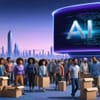The article highlights the darker side of artificial intelligence's impact on the workforce. While AI is often touted as a transformative force that can drive economic growth and innovation, it also poses significant challenges for workers who may find themselves displaced or struggling to adapt. Job displacement is a major concern, particularly in sectors where tasks are repetitive or can be easily automated.
The rapid evolution of AI technology requires workers to constantly update their skills, which can be a challenge for those who are not able to adapt quickly. Rather than a natural migration to new roles, many workers may experience a managed displacement, where they are forced to adapt to new technologies without a clear path to participate meaningfully.
This could exacerbate existing economic disparities, particularly if workers are not equipped with the skills needed to thrive in an AI-driven economy. As AI automates more jobs, many displaced workers may turn to the gig economy, which can lead to unstable and precarious work arrangements. Furthermore, AI-driven automation could lead to greater corporate consolidation, as large corporations are able to reduce their reliance on human workers and dominate the market.
To mitigate these challenges, investing in programs that help workers develop the skills needed to work with AI and adapt to new technologies is crucial. Public-private partnerships can also help ensure that workers are prepared for the demands of an AI-driven economy. Prioritizing human welfare and job security in AI development can help mitigate the negative impacts of job displacement. By acknowledging these challenges and working towards solutions, we can create a more equitable future for all.


